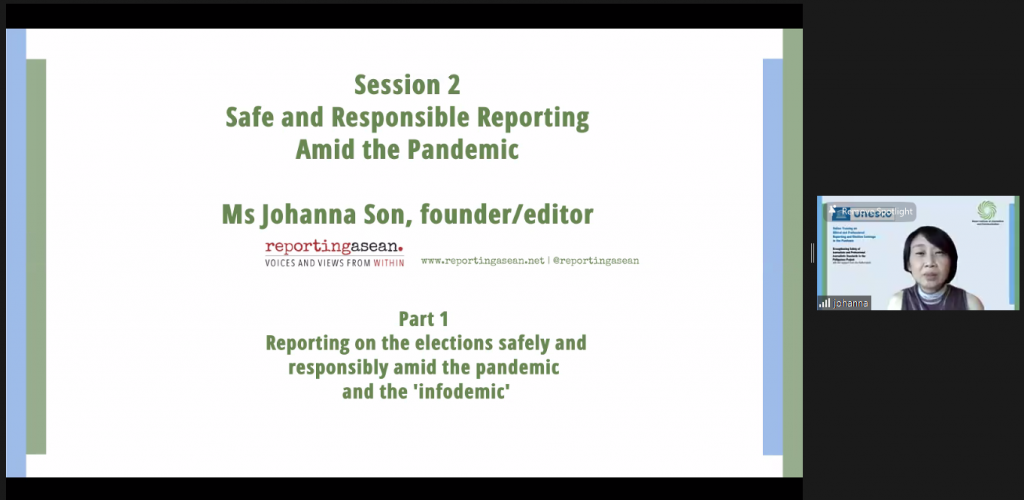Biased for the truth: Journalists weigh in on ethical election reporting amid COVID-19



Published Date: April 23, 2024
Ethical journalism helps the public stay informed about issues in their communities. When journalists abide by ethical standards, they help maintain their credibility and strengthen public trust in the media.
This was emphasized in the online training sessions on ethical and professional reporting and election coverage amid the pandemic organized by the Asian Institute of Journalism and Communication (AIJC) and UNESCO Jakarta with support from the Netherlands.
The three batches of the training, conducted from August to September 2021, were part of the Strengthening Safety of Journalists and Professional Journalistic Standards in the Philippines Project. The resource persons were Johanna Son, Filipino founder and editor of Reporting ASEAN, and John Reiner Antiquerra, Program Officer for Outreach and Communication at the Asian Network for Free Elections (ANFREL).
Antiquerra shared an overview of the second edition of the Code of Professional and Ethical Conduct in Covering Elections, developed by the Philippine Press Institute (PPI) in partnership with AIJC. He also discussed ethical challenges journalists face in the pandemic and how to address these.
Among the topics discussed was reporting issues in the proper context. One of the participants, CNN Philippines news producer JM Nualla, noted, “There are issues that are neither black nor white, and these should be carefully considered in the coverage.”
Antiquerra also reminded journalists to avoid false balance in reports by challenging misinformation or disinformation shared by news sources. “It is not enough to just interview people,” Antiquerra said. He added that journalists must do their research on the topic and do a background check on the source before conducting an interview.
In the session on safe and responsible election coverage amid the pandemic and the “infodemic,” Son noted the importance of being “non-partisan” but “not neutral.”
The resource persons and participants discussed how journalists must always side with the truth. This was reiterated by participant Rigie Malinao, publisher/managing editor of Samar Daily News Online: “Mahalagang mapanatili ang pagiging patas at pagiging biased sa katotohanan.” (Observing fairness and being biased for the truth is important.)
Another participant emphasized the kind of “bias” journalists must avoid: revealing their personal opinions on political issues on social media, which may influence how the public views their reporting. According to Angelique Rupisan, news reporter for GNN TV 44 Pampanga, “As a journalist, we must be very careful, or as much as possible we should avoid posting our opinionated political statements as it might give an impression to our audience as being biased.”
Son noted that while journalists naturally have their own biases and opinions, they should not let these influence their reports. She stressed the importance of reporting fairly.
A participant, VERA Files reporter-fellow Nica Hanopol, shared, “Look at issues not with a partisan mindset, but take a step back to see the bigger picture and make a story solid with facts/evidence/data that cannot be easily thrashed as a piece of opinion.”
As Son emphasized, credibility is the capital of journalists.
